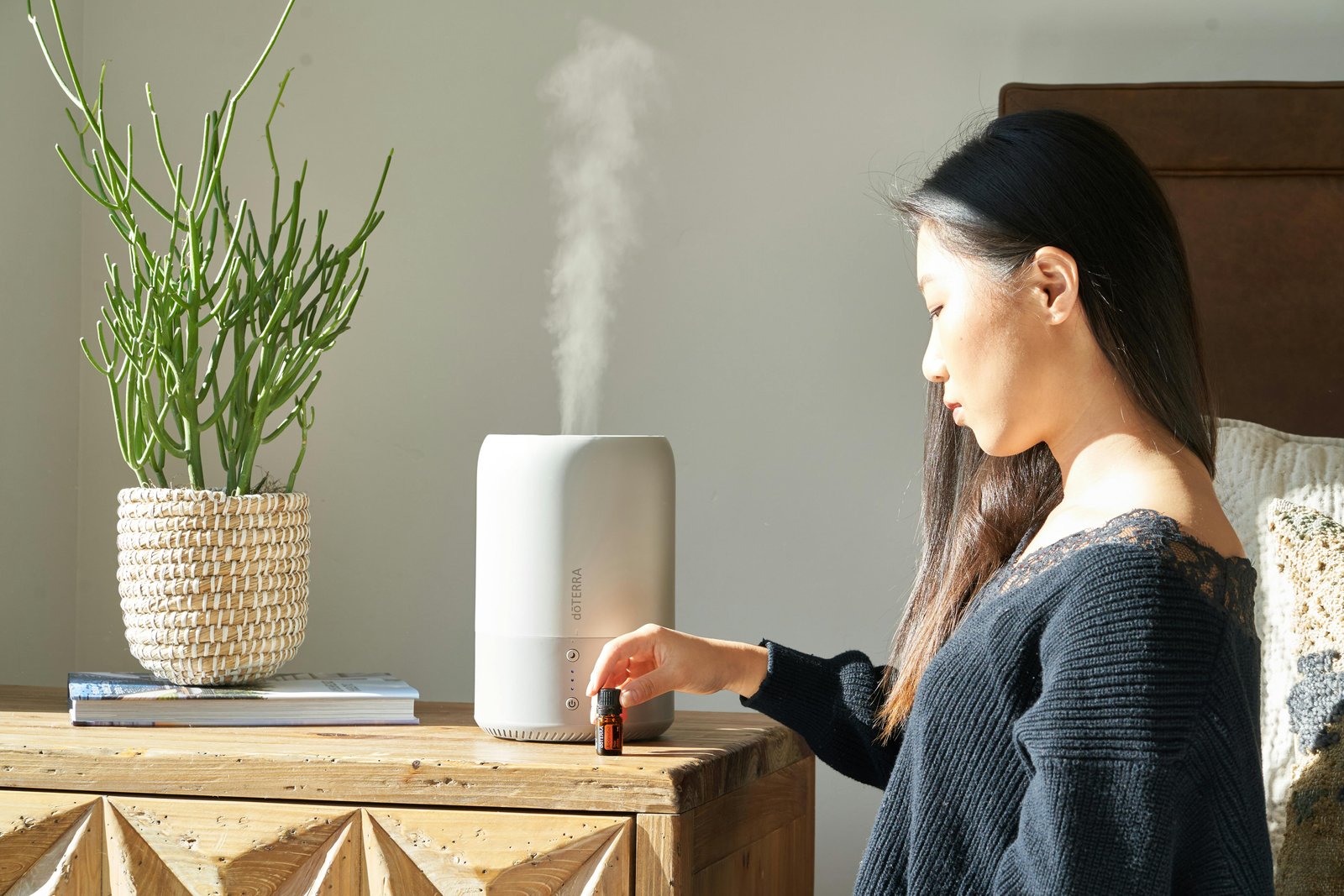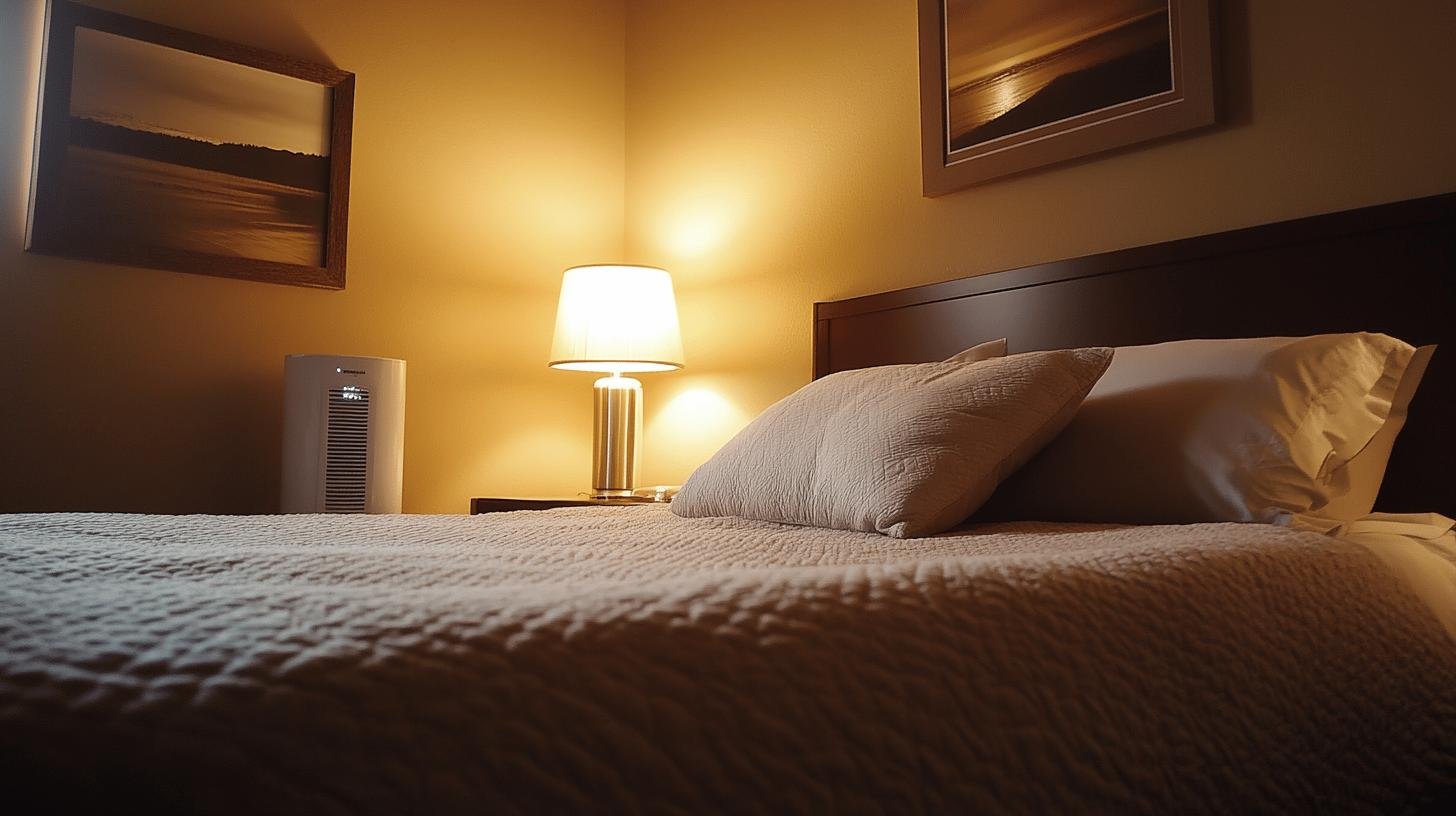TL;DR:
- 75% of asthma patients experience nighttime symptoms, disrupting sleep and leaving them exhausted.
- Nighttime asthma worsens due to cooling airways, hormone changes, and increased allergens.
- Strategies to manage nighttime asthma include:
- Elevating head and shoulders while sleeping.
- Using air purifiers to filter allergens.
- Following prescribed medications.
- Employing humidifiers.
- Minimizing bedroom allergens.
- Long-term control medications (e.g., inhaled corticosteroids) are essential for symptom management, while rescue inhalers are for emergencies.
- Monitor asthma symptoms: cough frequency, rescue inhaler use, sleep quality, and breathing difficulties.
- Regular check-ins with a healthcare provider are vital for effective asthma management.
Ever had that moment when an asthma cough wakes you up in the dead of night, making you feel like a zombie the next day? You’re not alone—nearly 75% of folks with asthma struggle with these nocturnal gremlins, especially around 4 am. It’s like your lungs picked the worst time for a dance party, right? Well, worry not! We’re diving into why this pesky cough flares up at night and, most importantly, how to stop it. So grab your favourite blanket, and let’s get you back to snooze town with some tried-and-true tips.
Understanding Nighttime Asthma Cough and Its Triggers
Nighttime asthma, or nocturnal asthma, can make restful sleep elusive. Imagine waking up around 4 a.m., struggling to breathe, or dealing with a persistent cough. This scenario is common for nearly 75% of asthma patients. Such symptoms disrupt sleep patterns, leaving you exhausted the next day. Recognizing this pattern is vital to regaining those peaceful nights.
Why does asthma worsen at night? When you lie down, your airways cool, causing them to tighten. Hormone changes and increased allergens while in bed also contribute. This combination creates the perfect storm of triggers, making it challenging to breathe and sleep.
Spotting these symptoms early is a game-changer. If you often wake up at night, it’s time for action. Recognizing symptoms and understanding triggers can lead to effective strategies, which can help you sleep well again. Monitor these symptoms and consult your doctor to design an asthma plan to prevent nighttime issues.
Effective Strategies for Reducing Asthma Cough at Night

Managing nighttime asthma is essential for a good night’s sleep and alertness during the day. Asthma flare-ups at night can leave you groggy. The good news? There are solid strategies to keep coughs away and make your nights restful.
Here are five actionable strategies to help:
- Adjust your sleep posture: Elevate your head and shoulders.
- Use air purifiers: Keep the air clean and allergen-free.
- Stick to prescribed medication: Follow your daily med routine.
- Employ humidifiers: Maintain optimal humidity for easier breathing.
- Minimize allergens: Keep your bedroom dust and pet dander-free.
Adjusting sleep posture can make a difference. By propping up your head and shoulders, you help keep airways open. This reduces post-nasal drip, a coughing trigger. It’s like giving your lungs more space to breathe.
Air purifiers and humidifiers are vital for nighttime asthma. Purifiers filter allergens like dust and pollen, while humidifiers add moisture, preventing dryness. Together, they create a spa-like atmosphere for your lungs.
Lastly, personalized care plans with your healthcare provider can tailor these strategies to fit your needs. Regular check-ins ensure your asthma management plan stays effective. It’s about finding what’s right for you.
Medication Management and Alternatives for Nighttime Asthma
Long-term control medications, like inhaled corticosteroids, are your primary defence against nighttime asthma cough. These daily meds manage inflammation. Less inflammation means fewer symptoms and better sleep, like a shield around your airways. If you haven’t started these, consult your doctor for a suitable fit.
For sudden cough attacks at night, quick-relief options are your allies. Rescue inhalers, like albuterol, act fast, relaxing tight airway muscles for smoother airflow. Keep one nearby for emergencies, but remember, they’re not for regular use. Frequent need signals a plan review with your healthcare provider.
Exploring Alternatives to Traditional Medications
Are you looking for non-prescription help? Lifestyle changes can complement your medication routine. Consider using a humidifier or air purifier in your bedroom to reduce airborne triggers.
Diet and exercise also play roles in asthma control. Eating anti-inflammatory foods and maintaining a healthy weight reduces lung pressure, supports asthma management, and reduces nighttime coughs. Keep your doctor informed when trying new strategies for personalized guidance.
How to Stop an Asthma Cough at Night: Tips

Keeping your sleeping environment clean helps manage asthma. Dust mites, pet dander, and allergens disrupt airways when you sleep. To prevent this, regularly clean your room—vacuum carpets, dust shelves, and wash bedding in hot water weekly—giving your lungs a break from irritants.
Air quality is vital for easy breathing at night. A humidifier adds moisture, easing breathing and preventing scratchy throats. An air purifier filters allergens like pollen and dust. Together, they create a cleaner, comfortable atmosphere.
Sleep position matters. Sleeping on your left side with a pillow between your legs opens airways, reducing diaphragm pressure and easing breathing. Back sleepers can elevate head and shoulders to curb post-nasal drip, keeping airways clear. Find what’s best for your lungs.
Craft a nightly routine supporting asthma management. Wind down with light stretching or meditation. Take prescribed meds as part of your bedtime ritual. Keep rescue inhalers handy. With planning and lifestyle tweaks, create an asthma-friendly routine for peaceful sleep.
Monitoring and Consulting for Nighttime Asthma Relief
Asthma monitoring systems are vital tools for handling nighttime asthma. They track lung health, preventing unexpected symptoms. Think of them as a personal weather report for asthma. Monitoring shows patterns and triggers behind nighttime coughs, allowing you to adjust routines. Keeping records can revolutionise your asthma management, whether it’s an app or a diary.
Here are four key indicators to track:
- Cough frequency: Note nighttime occurrences.
- Rescue medication use: Record inhaler usage.
- Sleep quality: Monitor nightly restfulness.
- Breathing difficulties: Watch for pattern changes.
Regular healthcare provider consultations act like having an asthma coach. They interpret monitoring data and adjust your asthma plan. Collaborate to fine-tune your approach, ensuring effective asthma management and reducing nighttime coughs. Keep communication open with your doctor for optimal results.
Final Words
Battling an asthma cough at night can seem daunting, but there are ways to ease those restless nights. We can address the core issues by grasping the nighttime asthma triggers, like cooling airways and allergens.
Implementing strategies, such as adjusting sleep posture and using air purifiers, is key. Consistent medication management, including prescriptions and alternatives, offers another relief layer.
Don’t forget the small lifestyle tweaks—cleaning routines and sleep adjustments can also play a big role. You’ll breathe easier in no time by consistently monitoring symptoms and syncing with healthcare pros.
FAQ
How to stop an asthma cough at night without an inhaler?
The fastest way to relieve an asthma cough involves non-inhaler methods, such as staying hydrated, using steam inhalation, or sleeping with extra pillows to keep upright.
How to sleep with asthma: positions?
Sleeping with asthma often means finding the right position. Elevating your upper body with pillows or sleeping on your left side can help ease breathing.
Can asthma kill you in your sleep?
Yes, asthma can be life-threatening if uncontrolled, even during sleep. Regular monitoring and proper management are crucial to preventing severe nighttime asthma attacks.
Why is asthma worse at night and in the morning?
Asthma worsens at night and morning because of cooler airways, hormone changes, lying flat, and allergens like dust mites disrupting sleep.
What triggers asthma attacks at night?
Factors like allergens in bedding, cold air, or chronic sinusitis trigger nighttime asthma attacks. Identifying these can help reduce nocturnal symptoms.
What helps an asthmatic cough at night?
Cleaning the bedroom, using air purifiers, and adjusting sleep position help reduce triggers. Regular medication and a humidifier also provide relief.
How to stop an asthma cough at night for toddler?
For toddlers, ensure their sleeping environment is allergen-free. Try using a humidifier and maintaining their prescribed medication routine.
Coughing and wheezing at night only in adults?
If coughing and wheezing only occur at night, it may be due to a post-nasal drip or GERD. Medical advice can pinpoint the exact causes.
How do you sleep with an asthma cough?
Sleeping with an asthma cough includes using extra pillows to prop up and keeping the bedroom allergen-free to ease breathing.

